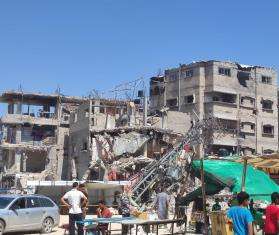Welcome to our new Alert. This is the first issue of MSF USA’s re-designed quarterly newsletter, and we hope you like it. We are happy to have more space to present the information we want to share with you, and more room to provide in-depth features conveying the scope of our work. We’re also happy to report that we've made these changes with little added cost.
This issue of Alert highlights devastating crises in South Sudan and Syria, conflict-related emergencies that are causing mass casualties and extensive displacement. In both places (and in neighboring countries), our medical teams are doing as much as they can to ease suffering and save lives.
First, South Sudan: Over the past year, more than 170,000 refugees fled fighting and aerial bombardments in Sudan, seeking shelter in overcrowded camps across the border in South Sudan. As of mid-September, MSF was conducting more than 9,000 medical consultations per week in field hospitals and clinics in several locations and has succeeded in reducing mortality rates that were previously well above emergency thresholds.
But media attention and the spontaneous support that often follows have been scant and grave concerns remain, which is why we took the unusual step of asking for support specifically for our South Sudan programs in a recent webcast and in select communications with donors. The costs of our refugee response, added to the costs of our pre-existing programs in the country, are now far above what we had allocated for this year and next. Therefore, we have been seeking earmarked donations to help us reach as many people as we can.
In Syria, access, not attention, has been the problem. The Syrian government has refused repeated requests for permission to operate within its borders, but an MSF team that entered the country was able to transform a regular home into a fully-functioning emergency hospital in one region, and teams in both Jordan and Lebanon are working with refugees who've fled the chaos.
In both cases, the projects needed certain supplies, often a lot of them, to function. We talked about how that happens with Bruno Delouche, the deputy manager of MSF’s logistical supply center in France, which oversees the construction and pre-positioning of emergency medical kits for many of our programs around the world. This behind-the-scenes work makes our operations possible; it helped get medical materials to Syrian doctors long before our teams got into the country and helped us scale up in South Sudan when refugees started pouring over the border. It ties in with our advocacy work as well, particularly our opposition to efforts by Novartis and Bayer to use legal maneuvering to limit the production of generic medicines in India—medicines our programs rely on.
We hope that you enjoy this new version of Alert, and, as always, thank you for your ongoing support for our work.

Sincerely,
Sophie Delaunay
Executive Director, MSF-USA



